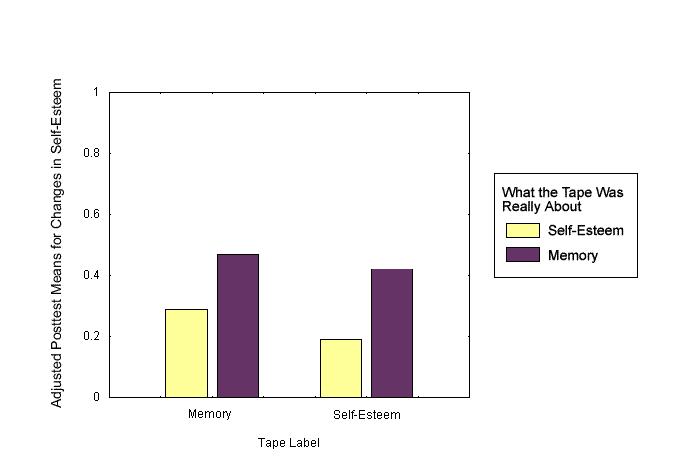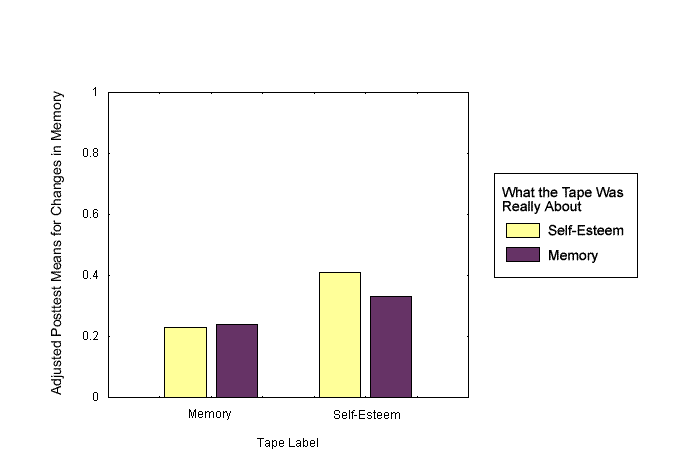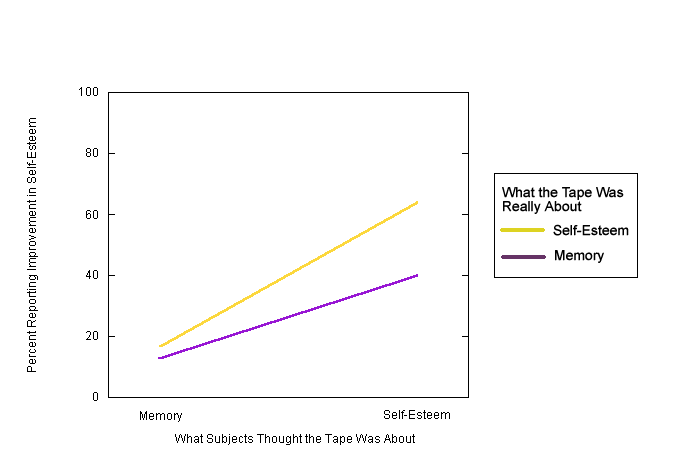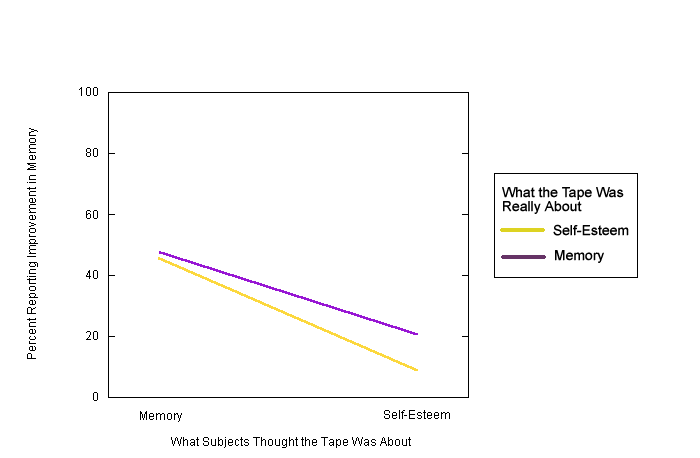Windows to Research: Subliminal audiotapes--Can they improve your memory or self-esteem?
Adapted from Greenwald, A.G., Spangenberg, E. R., Pratkanis, A. R., & Eskenazi, J. (1991). Double-blind tests of subliminal self-help audiotapes. Psychological Science, 2, 119-122.
Self-help audiotapes with subliminal content are commonly promoted as being able to improve various aspects of human life and behavior. The present research was conducted to test the claims of two types of subliminal self-help audiotapes, ones claiming to improve memory and ones claiming to improve self-esteem.
Participants were 228 men and women from the student and adult populations of two university communities. Posters and newspaper advertisements sought the participation of volunteers motivated to achieve both of the two goals claimed by the tapes. Actual content and labeled content of the tapes were manipulated, so that some subjects who believed they were using a memory tape were actually using a self-esteem tape, and vice versa. Thus, four groups were created:
1) participants receiving a self-esteem-labeled tape which actually contained self-esteem subliminal content,
2) participants receiving a self-esteem-labeled tape which actually contained memory content,
3) participants receiving a memory-labeled tape which actually contained memory subliminal content, and
4) participants receiving a memory-labeled tape which actually contained self-esteem subliminal content.
Mislabeled tapes thus allowed
for the creation of placebo groups for each content condition.
The audible content of the tapes consisted of surf and woodland sounds. Participants
completed both memory and self-esteem pretests, and after a month of daily use
of their assigned tapes, participants were re-tested on both memory and self-esteem.
Differences among groups on the pretests were statistically removed from analyses
so that pre-test differences do not confound comparisons among groups on the
posttest scores.
The researchers found that
neither the memory nor the self-esteem tapes produced their claimed effects.
Scores on the memory posttest were not significantly higher for participants
receiving subliminal memory content than for those receiving self-esteem content
[F(1, 224) <1]. Scores on the self-esteem posttest were significantly lower
for those participants who received the subliminal self-esteem content than
those who received the subliminal memory content [F(1, 224) = 9.12, p < .01],
a difference in the direction opposite to the claimed effect!
(See Figures 1 and 2.)
Figure 1. Adjusted posttest means as a function of audiotape subliminal content and tape label. The dependent variable is the average of standardized scores on multiple self-esteem scales; zero is at the mean of pretest scores.

Figure 2. Adjusted posttest means as a function of audiotape subliminal content and tape label. The dependent variable is the average of standardized scores on multiple memory scales; zero is at the mean of pretest scores.

Although posttest means tended to be greater for the correctly labeled condition than for the mislabeled condition, both for memory and self-esteem, the differences were not statistically significant [F(1,224) < 1 for self-esteem; F(1, 224) = 2.19, p > .05 for memory].
Although no actual effect of the subliminal content was demonstrated, results indicated that participants tended to believe that they had improved in the domain corresponding to the label on their assigned tape. Subjects who thought they were listening to memory tapes (whether they were or not) reported an improvement in memory; subjects who thought they were listening to self-esteem tapes likewise reported an improvement in self-esteem. Overall, approximately 50% of subjects believed that they had improved in the domain corresponding to the label on their tape, compared to only about 15% believing they had improved in the domain not labeled on the tape. (See Figures 3 and 4.) The researchers call this an "illusory placebo effect."
Figure 3. Percent of participants perceiving improvement in self-esteem as a function of audiotape subliminal content and tape label.

Figure 4. Percent of participants perceiving improvement in memory as a function of audiotape subliminal content and tape label.

Questions:
1. Results indicated that both self-esteem and memory scores generally increased above their pretest levels. To what effect(s) might these results be attributed?
2. Why was it important to recruit subjects who were motivated to improve both their self-esteem and their memory?
3. What type of study design was used in this investigation?
4. How many factors were included in this investigation? How many levels were there for each factor? How many outcome variables were included?
5. What might Figure 1 look like if the memory tape had worked as the manufacturer claimed?
6. What would Figure 3 look
like if it were redrawn in the same format as Figure 1?
(i.e., a bar graph)
7. Comment on the external validity of this study. To what population might these results be generalized?
8. What does the term "illusory placebo effect" mean? Why is it a placebo effect? What makes it illusory?
If you would like to learn more about Dr. Greenwald's current research projects, go to: Anthony Greenwald